Inaugural
address
This
place and our time
by President Richard H. Hersh
We
left the cold war in the spirit of promise yet the 21st century has hardly
begun and a sense of peril has returned. We have been told that there is a
“new world order,” a seemingly arrogant extension of the just-completed,
so called American Century. But this label may have been premature. There is
a new world but order is not its nature—indeed just making sense of it is
the most urgent and confusing task. Where there is “order,” it is not at
all new but rather the same old oppressions that rightly offend the moral
sensibilities of humankind. And the hope that a new world order could be
achieved, pivoted violently on September 11, 2001, when we began to
understand that nothing less than civilization is at stake.
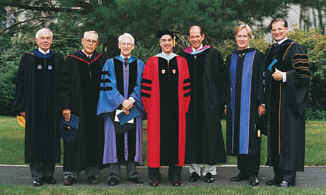 I
do not speak of an Armageddon—in which forces of good and evil
battle—each earnestly believing that one is good and the other evil. Nor
is this about East-West confrontation, in the sense of armed missile
standoff, or totalitarianism versus freedom, or capitalism versus communism,
or even Jihad versus McWorld.
I
do not speak of an Armageddon—in which forces of good and evil
battle—each earnestly believing that one is good and the other evil. Nor
is this about East-West confrontation, in the sense of armed missile
standoff, or totalitarianism versus freedom, or capitalism versus communism,
or even Jihad versus McWorld.
The
power of the moment is noteworthy, not because the media tell us, over and
over and over, but because of the powerful forces, emotions, and fundamental
beliefs in play. The murderous events of the past several years in such
places as Bosnia, Rwanda, the Middle East, and New York City discredit moral
relativism, but with them also comes the great danger of mistakenly
discrediting the essential urge and need to understand each other,
especially the foreign and the alien-to-us. Students come to campuses today
understandably bewildered by all this, a mood that matches their adolescent
time-of-life and their innate curiosity, awakening, quickening, and
questioning.
This
is the moment when we need to revalue the concept of civilization, of what
it means to be fully human, of a commitment to tolerance and freedom, of an
awareness of world-wide interdependence. I am talking about our need to
empower a new generation with what it means to be civilized.
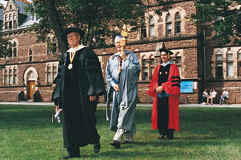 The
playwright and Czech president, Vaclav Havel, foretold this need in a speech
to the United States Congress more than a decade ago:
The
playwright and Czech president, Vaclav Havel, foretold this need in a speech
to the United States Congress more than a decade ago:
The
salvation of this human world lies nowhere else than in the human heart, in
the human power to reflect, in human meekness and in human responsibility.
Without a global revolution in the sphere of human consciousness,
nothing will change for the better in the sphere of our being as humans, and
the catastrophe toward which this world is headed, be it ecological, social,
demographic or a general breakdown of civilization, will be unavoidable. (Havel,
1990)
Havel
reminds us that in all economic, social, political, or moral issues, it is
consciousness, reflection, caring, humility, moral sensibility, and the
fullness of the human spirit that matter. These, as it happens, are the
outcomes of what has historically been meant by liberal education and to
accomplish this, America must reclaim liberal education, and—if we hope to
accomplish the civilizing task before us—affirm the character of its
liberal arts colleges. Yet we face in American life today a crisis of
legitimacy in which liberal education and liberal arts colleges in
particular are increasingly perceived as irrelevant.
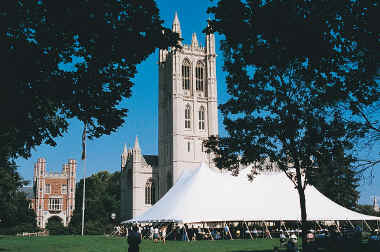 Throughout
the 1950s and early 1960s, the United States, having come triumphantly
through the ravages of World War II, was at its apex of influence.
Americans could and did imagine that the goal of higher education was
ideologically and economically to sustain the status quo.
Each succeeding generation of undergraduates would receive
essentially the same education, but for the purpose of assuring greater
material and social success than their parents had enjoyed.
Teaching was conceived basically as transmitting received general
knowledge to students. Learning
was conceived basically as absorbing that knowledge. This was the
culmination of the 500-year academic history since the Enlightenment, the
triumph of Erasmus, and the near-fulfillment of the “dream-of-reason”
conjured by Newton and Descartes.
Throughout
the 1950s and early 1960s, the United States, having come triumphantly
through the ravages of World War II, was at its apex of influence.
Americans could and did imagine that the goal of higher education was
ideologically and economically to sustain the status quo.
Each succeeding generation of undergraduates would receive
essentially the same education, but for the purpose of assuring greater
material and social success than their parents had enjoyed.
Teaching was conceived basically as transmitting received general
knowledge to students. Learning
was conceived basically as absorbing that knowledge. This was the
culmination of the 500-year academic history since the Enlightenment, the
triumph of Erasmus, and the near-fulfillment of the “dream-of-reason”
conjured by Newton and Descartes.
The
60s brought the dream of universal higher education, a massive increase in
access to colleges and universities, and a questioning of those nostalgic
and static curricular and pedagogic assumptions.
This access, for all its significant advances in enfranchising
growing numbers of Americans with the benefits of a college degree, led to
anonymity on too many large university campuses.
With that anonymity came lost opportunities to educate students
effectively. Phil Ochs, the
folk-protest singer, put it to lyric,
Oh,
I am just a student, sir, and only want to learn . . .
Oh
you’ve given me a number and you’ve taken off my name
To
get around this campus why you almost need a plane (from Gonna Say It Now,
by Phil Ochs)
From
the dream of accommodating literally millions of new students in
universities, we awaken now to the same 19th-century English work-house and
factory model on which our elementary and secondary schools were built.
Moreover, higher education has turned to a narrowed conception of itself as
a mechanism for pre-professional and vocational training. In its effort to
make the best education accessible to the many, America has, in effect,
turned away from the liberal education ideal it once valued only for its
elite—the provision of the foundational knowledge, intellectual, ethical,
and civic abilities that democracy requires from its leaders and citizens,
and the demanding, albeit more costly, handcrafted education necessary to
attain those ends. In a very real sense, we have defined excellence down and
mediocrity up!
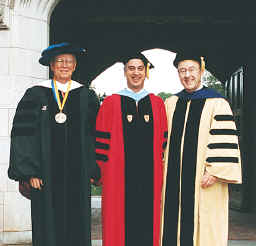 Most
undergraduates rarely if ever experience an alternative to the mass
education and mass culture through which they have been “processed”
since childhood. As a result, higher education is at risk of losing its soul
just when that soul needs most to be strong.
The double tragedy is that too few inside education have actually
noticed and too few outside education understand or value liberal learning
enough to care.
Most
undergraduates rarely if ever experience an alternative to the mass
education and mass culture through which they have been “processed”
since childhood. As a result, higher education is at risk of losing its soul
just when that soul needs most to be strong.
The double tragedy is that too few inside education have actually
noticed and too few outside education understand or value liberal learning
enough to care.
If
liberal education finds itself in a crisis of legitimacy, it is because the
impersonal McVersity approach to education, with its emphasis on overly
specialized research, use of graduate students as undergraduate teachers,
and large classes exacts a huge toll. Less
than 48 percent of students graduate. Yet,
paradoxically, these are the campuses of choice for the large majority of
college students because in addition to perceived lower cost, they and their
parents are attracted to what is essentially job training masquerading as
education.
Others
suggest that the way to solve cost and efficacy problems in higher education
is to increase the use of technology. Students, they say, no longer need
classroom interaction. There is
a better way, a brave new virtual reality university now available through
the wonders of technology!
I
am no Luddite who would deny that technology can be useful in teaching. But
many such proponents have become unthinking enthusiasts—we face another
sort of high-tech bubble that cannot meet expectations before bursting and
getting everyone wet. In a world that is increasingly fragmented by fear of
difference and by specialization of knowledge, in a world that has lost a
sense of connection between the individual and community, and in a world of
learning malls catering to the whims of its customers, there can be little
hope of achieving what Havel called “a global revolution in the sphere of
human consciousness” if we feed our students the intellectual equivalent
of Happy Meals.
Many
young people today are fearful and come to campuses in a state of anxiety
about the future of this country—after all, they have been taught that we
were once the indispensable nation without which freedom and the world
economy could not survive. They are bombarded with masses of information but
can construct little secure meaning from it all. They feel a lack of
direction.
Our
challenge is to inspire young men and women with the confidence that they
will be able to construct a future intelligently and to use power for good
as they steer a course in the world. We can inspire only if we nurture in
them the kinds of intellectual, imaginative, and ethical responsibility and
responsiveness they will need. Doing
so requires the kind of education that cannot be left to graduate assistants
or computers. Literally and figuratively, what we need is the polar opposite
of “distance learning.”
What
our society should expect from higher education in the 21st century is a
level of excellence that historically has been the province of small liberal
arts colleges. The sole mission
of such colleges is to teach students the best of human thought and feeling
and to help develop in them both a secure sense of their own voices, enough
mental toughness and resourcefulness, and enough humility to seek out the
wisdom of others. These
colleges demand of students that they become accountable for and articulate
in their thinking, their writing, their speaking and their behavior.
Here a liberal arts education is ultimately an education in the use
of one’s imagination, judgment, and compassion—of the ethical and
emotional intelligence required to live life responsibly in a diverse and
complex world.
The
Socratic teaching that characterizes small liberal arts colleges, in which
there is close interaction among students and faculty, is not some antique
method thought to exist in the mythical ideal academy. It is a hands-on
vital and rigorous methodology; it forces the questioning of oneself and
others. It also requires respectful consideration for the views that others
express. It is immersion in a
very real and vibrant way of life twenty-four hours a day.
In this sense, small liberal arts colleges are not ivory towers; they
are crucibles of learning for all that Havel reminds us “lies in the human
heart, in the human power to reflect, in human meekness, and in human
responsibility.”
If
higher education loses its grounding in liberal arts, that consciousness is
in danger of being lost and with it our students’ ability to appreciate
the complexity, the wonder, the dangers, and the sheer poetry of the human
condition. That will not happen at Trinity College. I promise you.
Trinity
embodies the true value of liberal arts traditions and we understand that to
continue to do so at the dawn of the 21st century requires that we apply the
intellectual, ethical, and civic skills historically associated with liberal
learning in ways that respond intelligently and effectively to the changing
needs of today’s undergraduates. Indeed, the Trinity faculty has begun an
intensive and extensive review of our curriculum and teaching practices. I
can assure you that whatever the outcome of that review, we will demonstrate
both the intellectual and the practical advantages a liberal education can
offer in our world today.
Trinity
is already recognized as a leader among American liberal arts colleges. Let
us say that without false modesty. But our outstanding faculty and students
are not satisfied—we are exploring how best to raise the standards of
academic excellence, explore new ways to engage each other inside and
outside the classroom, to more fully convey why the examined life is the
only one worth living. We will:
1.
demand more of our students as we engage them with the best ideas across
cultures, geography, and time.
2.
provide more opportunities for student research with faculty.
3.
offer more innovative assessment of learning to provide feedback to both
students and faculty while teaching and learning are still taking place.
4.
deepen and expand our work in the community.
5.
enrich our international programs.
We
are going to do all this, in fact, with the aid of a new, state-of-the-art
library and information technology center—that is indeed appropriate
technology—and Hartford, the city that helped found Trinity in 1823 and
now offers students opportunities to experience and practice the best of
what they learn—the creation of genuine, authentic and moral communities.

We
seek nothing less than to inflame our students’ imaginations.
It may seem rhetorically easy to say we ask that students fall in
love with the idea of membership in a vital and vibrant intellectual
community. We intend to allow
it, encourage it and make it happen—to generate extraordinary, unique, and
astonishingly creative graduates who consider nothing in the world beyond
the grasp of their mature gifts, students who are fearless in remaking the
world when they enter it.
Trinity
is a special kind of place, especially in this time. We will be successful because we understand that the lesson
for the 21st century is this: we
are on stronger educational and moral ground if we embrace
diversity—different ideas, perspectives, people, and places because that
is the best way human beings learn to live with each other.
Diversity is a crucial ingredient to help students face the
contradictions central to learning how to think and to develop the personal
ability to work with people from a spectrum of backgrounds on common ground
for common but important goals. This is not about affirmative action or
political correctness, but rather a purposeful and powerful educational
strategy to best prepare students for the places that await them in the
modern world.
We
will be successful because we understand the importance and nature of moral
education. However entangled
the individual strands of morality are in practice, there is a difference
among them that we understand. All
models of moral education refer, directly or indirectly, to the separate
processes of caring, judging and acting.
Morality is neither good motives, nor right reason, nor resolute
action; it is all three. That is why learning for us must take place on and
off the campus, through study at home and study abroad.
And
we will be successful because we understand the need for passion. We know we
can teach students organic chemistry. We
know we can teach them Keynesian economics or the history of the Italian
Renaissance and sort through conflicting concepts of Reformation.
But we understand that if that is all we do, we will have failed our
students, our community, and ourselves as an institution.
We are not talking about mindless passion.
That kind of passion is dangerous—as is demonstrated every day in
the murderous violence loose in the world.
We
are talking about passion with a conscience, passion that has an ethical
component—a brain, a heart and a spine—and eyes that see beyond the easy
advantages of an Enron moment, to ultimate consequences. If we don’t teach
students about passion in that process, we leave them dulled.
They will have all the knowledge and skills they need to act, but not
the focus or the motivation or the profound caring that will cause them to
use their skills, and to use them well. If the way we teach brings students
to the intellectual and emotional flash point—of that kind of
passion—then we have not merely graduated them but transformed them.
I
am talking about what endures. I
am talking about a commitment to a special kind of education—that which
produces graduates who remember what and who made the difference in their
lives. Graduates who enter the
world with fiber, compass, and grit, with a set of sustaining values wed to
the highest competence and standards, and fired by passions that can
illuminate their own lives and light up their own times.
This
should be the character of small, liberal arts colleges. We carry that
standard and banner. It is the age-old promise of this place called Trinity
College. And we are needed, in our time, more than ever.
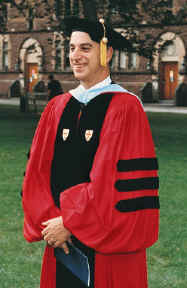 Richard
H. Hersh was inaugurated on September 22, 2002, as the 19th president of
Trinity College. More than 1,500 alumni, students, and guests gathered to
celebrate the occasion, during which Hersh was welcomed by dignitaries,
alumni, and educators and outlined his vision for the future of the
College and of liberal arts education.
Richard
H. Hersh was inaugurated on September 22, 2002, as the 19th president of
Trinity College. More than 1,500 alumni, students, and guests gathered to
celebrate the occasion, during which Hersh was welcomed by dignitaries,
alumni, and educators and outlined his vision for the future of the
College and of liberal arts education.  I
do not speak of an Armageddon—in which forces of good and evil
battle—each earnestly believing that one is good and the other evil. Nor
is this about East-West confrontation, in the sense of armed missile
standoff, or totalitarianism versus freedom, or capitalism versus communism,
or even Jihad versus McWorld.
I
do not speak of an Armageddon—in which forces of good and evil
battle—each earnestly believing that one is good and the other evil. Nor
is this about East-West confrontation, in the sense of armed missile
standoff, or totalitarianism versus freedom, or capitalism versus communism,
or even Jihad versus McWorld. The
playwright and Czech president, Vaclav Havel, foretold this need in a speech
to the United States Congress more than a decade ago:
The
playwright and Czech president, Vaclav Havel, foretold this need in a speech
to the United States Congress more than a decade ago: Throughout
the 1950s and early 1960s, the United States, having come triumphantly
through the ravages of World War II, was at its apex of influence.
Throughout
the 1950s and early 1960s, the United States, having come triumphantly
through the ravages of World War II, was at its apex of influence. Most
undergraduates rarely if ever experience an alternative to the mass
education and mass culture through which they have been “processed”
since childhood. As a result, higher education is at risk of losing its soul
just when that soul needs most to be strong.
Most
undergraduates rarely if ever experience an alternative to the mass
education and mass culture through which they have been “processed”
since childhood. As a result, higher education is at risk of losing its soul
just when that soul needs most to be strong.